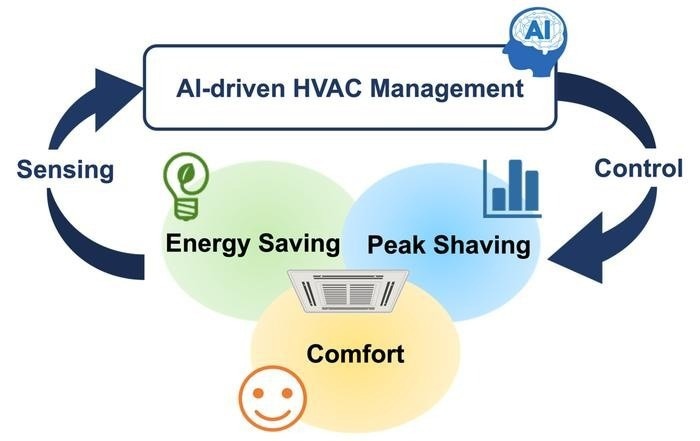
Overview of Data-driven Online Energy Management Framework. Image Credit: Ittetsu Taniguchi
During cold weather, it might be difficult for traditional sensor-based systems to detect when the heating should be turned off. Thermal interference from lighting, equipment, or even heat created by the employees themselves causes this. As a result, the HVAC system can get triggered when it should not be, squandering energy.
To solve these challenges, the researchers used a control system that predicted the building’s thermodynamic reaction based on the data obtained. This method could prove more successful than attempting to directly compute the effects of the several complicated aspects that may influence temperature, such as insulation and heat generation.
Thus, given enough data, ‘data-driven’ techniques could frequently beat even sophisticated models. Based on a vast dataset, the HVAC control system was developed to ‘learn’ the symbolic correlations between the variables, including electricity usage.
The algorithm managed to conserve energy while preserving the comfort of the building’s residents.
Our autonomous system showed significant energy savings, of 30% or more for office buildings, by leveraging the predictive power of machine learning to optimize the times the HVAC should operate. Importantly, the rooms were comfortably warm despite it being winter.
Dafang Zhao, Study Lead Author and Assistant Professor, Osaka University
The algorithm sought to reduce the amount of energy used overall, the discrepancy between the actual and target room temperature, and the variation in the rate of power production at peak demand.
Our system can be easily customized to prioritize energy conservation or temperature accuracy, depending on the needs of the situation.
Ittetsu Taniguchi, Study Senior Author, Osaka University
It is quite likely that businesses will need to be at the forefront of innovation for society as a whole to realize the aim of a carbon-neutral economy. The researchers point out that their strategy could be quickly adopted in times of increased energy prices, which makes their findings advantageous for both the environment and business survival.
Journal Reference
Zhao, D., et al. (2023) Data-driven online energy management framework for HVAC systems: An experimental study. Applied Energy. doi:10.1016/j.apenergy.2023.121921